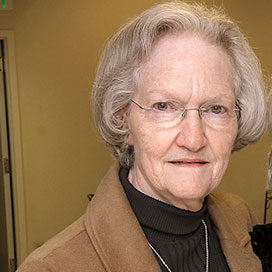 Betty W. Vaughan, M.D., is giving back by making a legacy scholarship with a charitable gift annuity.
Betty W. Vaughan, M.D., is giving back by making a legacy scholarship with a charitable gift annuity.
Ask School of Medicine 1963 alumna Betty W. Vaughan, M.D., to describe attending medical school in the 1960s, and one word comes to her mind: fun. Dr. Vaughan’s class was a close-knit group in which breaking bread together was as common as cramming for an exam—her definition of fun.
“We did everything together: studied together, played together, and enjoyed each other’s company,” reminisces Dr. Vaughan, who had a prolific career in public health. “You retain more information when you’re in a group, and we learned so much from each other.”
Despite being one of only eight women in a class of 80, Dr. Vaughan said she didn’t experience sexism from her classmates or instructors while at the School of Medicine.
“There were outsiders who told me I was taking a man’s place. I responded, ‘No, I’m not. I’m taking my own place,’” she recalls, a grin apparent in her voice. “If my professors saw sexist behavior, they didn’t condone or tolerate it. The professors and attendees also made themselves accessible in case you needed to talk to them about a problem. However, people in my class weren’t sexist.”
Dr. Vaughan made a legacy scholarship gift with a charitable gift annuity. Her scholarship, the Betty W. Vaughan, M.D., Medical Scholarship, aims to allow the next generation of UAB medical students to experience a similar type of camaraderie. The scholarship is for third- and/or fourth-year students who demonstrate a strong interest in primary care.
Now couldn’t be a better time to encourage medical students to pursue careers in primary career, as the U.S. is currently short about 29,000 primary care doctors, according to The New York Times. By 2025, the Association of American Medical Colleges estimates the U.S. will be short 90,000 doctors, with primary care physicians accounting for about 35 percent of that shortfall. General practitioners often get paid less than their subspecialty colleagues, but providing them with scholarships during medical school helps alleviate the debt burden with which they graduate.
Dr. Vaughan says she hopes her scholarship also helps those who hesitate to pursue medical school because of financial constraints achieve their dreams. Coming from a modest background with a father who was a farmer and a mother who was a housewife, Dr. Vaughan notes she relied on scholarships to get her through college and medical school. “I know where some of these students who are worrying about money are coming from, so I hope this scholarship helps them,” she says.
Dr. Vaughan acknowledged she also feels obligated to contribute because the school gave her so much. From forming lifelong friendships with her classmates to forging enduring bonds with professors and attendees, Dr. Vaughan received more than an education.
“I was really close with and admired Dr. Sara Crews Finley and her husband, Dr. Wayne H. Finley,” she says. “They were so gracious to me. Sara had such a tremendous impact on my life that I even named my youngest daughter after her.”
Dr. Vaughan’s family was her driving influence for pursuing a career in public health. During her more than 30 years at the Alabama Department of Public Health, she enhanced public health services while improving the status of both providers and facilities. In 1973, Dr. Vaughan became the first woman to receive the William Henry Sanders Award for service in public health above and beyond the call of duty.
“The School of Medicine is uniquely qualified to handle the unique health challenges Alabama faces—which include infectious disease control and environmental hazards—because it has an outstanding curriculum with a visionary dean,” she says.
Dr. Vaughan is a visionary herself. She helped create the first multicounty district in public health. After her retirement, she also served as the president of the University of Alabama Medical Alumni Association.
Now she wants the next generation of medical students to take the torch from her and keep running. Her scholarship is the next phase in her plan to strengthen the medical community in Alabama.
“I tell people to find a dream and go for it,” she says.
To talk to someone about how you can support our medical students by establishing a new scholarship or donating to an existing scholarship, contact Jessica Brooks Lane, Director of Development for Medical Scholarships and Primary Care, at 205-975-4452 or jblane@uab.edu.
For more information about the school’s scholarship priorities, visit www.uab.edu/medicine/home/give/priorities/scholarships.
By Emily Henagan